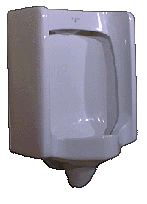| Peep-Hole Reporters Are
Cruising Men’s Restrooms
Newscaster Voyeurs: Sad Turn
Toward Top Ratings
Compiled by
Badpuppy’s GayToday
From a National
Lesbian and Gay Journalists Association Report
|
 |
Several local television news
outlets around the country are exceeding the bounds of journalism standards
and taste by featuring lurid images on news broadcasts based on hidden
surveillance of sexual meeting places, the National Lesbian and Gay Journalists
Association has announced.
"As an organization that
represents lesbian and gay professionals concerned with responsible portrayal,
we deplore this kind of voyeuristic broadcast journalism," said Karen Boothe,
NLGJA president.
"NLGJA in no way condones
illegal sexual activity in public places," said Boothe. "But nor do we
condone exploitative coverage that panders to sexual curiosity as a way
of pumping up ratings." Boothe added that reporting of improper conduct
anywhere must meet journalistic standards of accuracy, relevance and good
taste.
Boothe referred to several
instances in which news stations, some using hidden cameras, spy on rest
stop and bathroom locales allegedly used as sexual meeting places by males.
This unprecedented use of secret news cameras in restrooms has turned up
in several cities-up to 20 according to an article published in The Village
Voice this week. They include San Antonio, San Diego, Chicago, Miami, Charlotte
and Albuquerque. Fox's Channel 5 in New York ran such a segment on Monday,
May 11, 1998.
The Voice article, by Richard
Goldstein, reports that in many cases cameras are intruding in business
and other private establishment restrooms without permission. In one case,
the newspaper quotes a reporter who said he sat on a toilet seat for some
time with a camera hidden in his shoulder bag, waiting until someone approached
him.
In San Antonio, station KENS-TV
last year ran a story that depicted nude men in a sexual act in a restroom,
causing a community furor over such images. Similar images were presented
in a recent San Diego broadcast news segment.
"Depicting such images, homosexual
or heterosexual becomes suspect when highly promoted as investigative journalism,"
said Boothe, who is political correspondent for Minnesota Public Radio.
She continued: "Public sex
is as foreign to the lives of most gay people as it is to most straight
people. Males who engage in this practice with other males are usually
those whose fear of societal condemnation makes them afraid to frequent
clubs and bars where they risk being identified."
Boothe said such stereotypical
stories rarely examine the societal pressures that push people to have
anonymous sex. What's more, day-to-day coverage on these stations often
fails to present an accurate portrait of gay people living healthy and
productive lives.
NLGJA works within the news
industry to foster fair and accurate coverage of lesbian and gay issues
and opposes newsroom bias against lesbians and gays and all other minorities.
Since its founding in 1990, NLGJA has grown to a 1,200 member, 23-chapter
organization in the U.S. and Canada. Its members are available as resources
when questions of ethics or newsworthiness arise. |